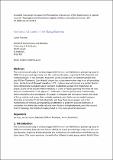Vortices and atoms in the Maxwellian era
Abstract
The mathematical study of vortices began with Herman von Helmholtz's pioneering study in 1858. It was pursued vigorously over the next two decades, largely by British physicists and mathematicians, in two contexts: Maxwell's vortex analogy for the electromagnetic field and William Thomson's (Lord Kelvin) theory that atoms were vortex rings in an all-pervading ether. By the time of Maxwell's death in 1879, the basic laws of vortices in a perfect fluid in three-dimensional Euclidean space had been established, as had their importance to physics. Early vortex studies were embedded in a web of issues spanning the fields we now know as ‘mathematics’ and ‘physics’—fields which had not yet become institutionally distinct disciplines but overlapped. This paper investigates the conceptual issues with ideas of force, matter, and space, that underlay mechanics and led to vortex models being an attractive proposition for British physicists, and how these issues played out in the mathematics of vortices, paying particular attention to problems around continuity. It concludes that while they made valuable contributions to hydrodynamics and the nascent field of topology, the British ultimately failed in their more physical objectives.
Citation
Falconer , I J 2019 , ' Vortices and atoms in the Maxwellian era ' , Philosophical Transactions of the Royal Society. A, Mathematical, Physical and Engineering Sciences , vol. 377 , no. 2158 , 20180451 . https://doi.org/10.1098/rsta.2018.0451
Publication
Philosophical Transactions of the Royal Society. A, Mathematical, Physical and Engineering Sciences
Status
Peer reviewed
ISSN
1364-503XType
Journal item
Collections
Items in the St Andrews Research Repository are protected by copyright, with all rights reserved, unless otherwise indicated.

